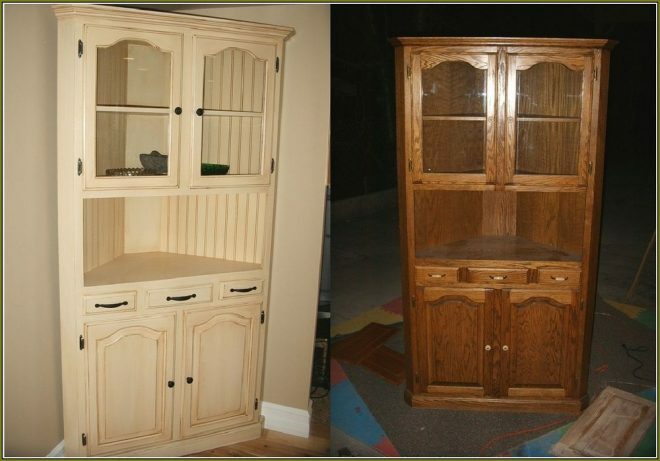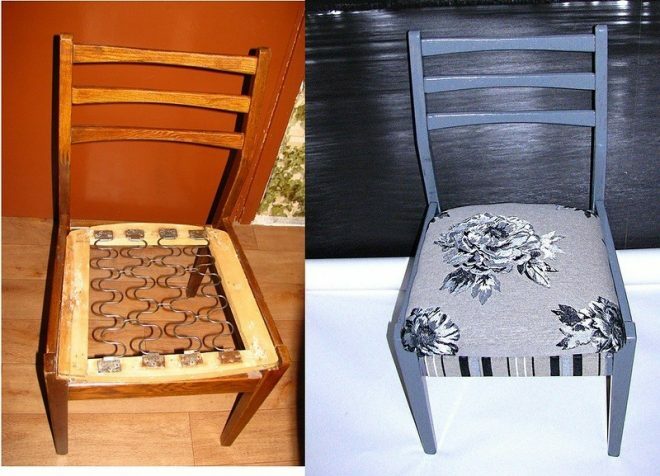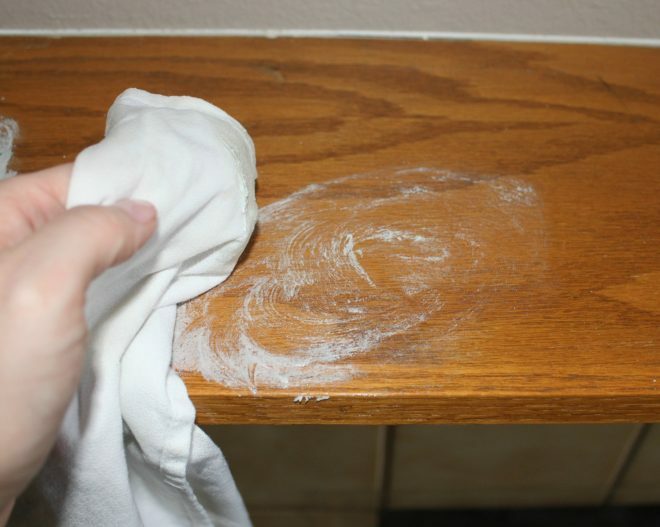You will have to pay a considerable amount of money to restore old furniture, so many people try to do this work on their own. Outdated tables, wardrobes and nightstands can be breathed new life. From our article we will learn how to restore old furniture with our own hands, photos will be given below.

What does DIY furniture alteration consist of?
In practice, a huge number of options for restoring furniture are used. The choice of a particular method will depend on the piece of furniture and the practical knowledge and skills of its owner. The working tool is selected depending on the specific technology.
Attention! Earned on our website kitchen designer. You can familiarize yourself with it and design your dream kitchen for free! May also come in handy wardrobes designer.
There are different options for rework:
- decoupage;
- painting;
- hauling;
- aging of wooden surfaces with varnishes;
- decorating products with fabric;
- painting with paints;
- veneering;
- varnishing.
Old chairs and cabinets can be restored in different ways, but before carrying out any basic work, you need to make sure that these household items do not have damaged, warped or rotted areas.

What tools and materials will be needed
The choice of materials and working tools depends on the specific method of furniture restoration. For painting or varnishing products, you will need paint of the selected color, varnish, sandpaper fine grain, respirator, rubber gloves, water, tape, paint tray, paint brush or roller.
If you need to make the sofa upright, then the tool here will need a slightly different one. These are upholstery in the selected color, scissors, a stapler and staples, and a pencil. When aging wood, it is necessary to purchase special colorful compounds or varnish, as well as a respirator, sandpaper, rags and solvent.
When using decoupage, you need to choose special glue and stencils. In the case of decorating furniture with fabric, we need a pencil, a ruler, scissors and upholstery in the selected color.

Preparation as the basis of work
Before finishing in any chosen way, you need to properly prepare the base. The workflow takes place in the following order:
- We determine the amount and nature of damage on the surface (scratches, abrasions and other defects).
- We clean the base from dirt and dust. For this, warm water with detergents is used. The furniture is dried.
- Wooden products are disassembled into separate elements. When replacing or restoring the legs of chairs or a table, they must be removed, which will greatly facilitate the procedure. In addition, during subsequent processing, the rest of the parts will not break or get dirty.
- If it is not possible to disconnect a separate part, it is sealed with tape. For this procedure, masking tape is used, which does not leave a mark on the product.
- The preparation of upholstered furniture is carried out with great care. Remove the upholstery and padding, then replace these materials with new ones.
In order not to forget anything during assembly, write down all the defects present on a sheet of paper. This will eliminate even minor abrasions.

Removing the polishing layer
If necessary, remove the polishing layer, but for this you need to prepare the following tool:
- special solution for removing polish;
- coarse sandpaper;
- steel wool;
- putty knife;
- paint brush with natural bristles;
- paper towels.
Polishing removers can be thin or thick. The last means are used to process vertical parts, liquid ones are applied to carved elements and in hard-to-reach places.
Consider the nuances of the workflow using the example of a thick product:
- Pour the solution from the bottle into a wide bowl. Take a paintbrush and apply it in a thick layer to the wood surface.
- We wait for a certain time until the composition softens (indicated by the manufacturer in the instructions) and remove it with a spatula in the direction of the fibers. In hard-to-reach places, a toothbrush is used for this purpose.
- The rest of the solution is cleaned with metal wool, then wipe the surface with a dry towel.
- We clean the irregularities with medium-grain sandpaper
Work must be carried out in a well-ventilated area, the respiratory system is protected with a respirator, and rubber gloves are put on hands. The thick composition is applied in one direction for layer uniformity.

How to transform old furniture
Everyone can breathe new life into old furniture with their own hands, the photo shows the most common options. Let's take a closer look at the technology for performing work in more detail.
Replacement of furniture fittings
With prolonged use of cabinets and nightstands, furniture fittings first of all deteriorate. These are door hinges, handles, guides and other elements. Such details can simply be replaced with new samples. These can be purchased at a specialist store.
Most often, hinges become unusable, they receive a load from opening or closing doors. During operation, these elements bend, after which the canvas begins to sag. When replacing, unscrew the screws in the loop with a Phillips screwdriver and insert a new element. Instead of a screwdriver, you can use a screwdriver for this purpose.
When replacing the guides that hold the drawers in the nightstand or chest of drawers, you must unscrew the old element with a screwdriver. New parts are fixed at the same level, but the screws must be tightened in new places. For continuous operation, ball guides are the ideal choice. When replacing the handle of the shelves, it is enough to unscrew the bolts, then install a new element and tighten the fasteners.

Furniture painting
Do-it-yourself remodeling of old furniture often involves painting wood products. Before proceeding with such activities, it is necessary to properly prepare the surface. There are several methods for cleaning the substrate:
- The chemical method involves the use of various reagents to remove the old coating. The tool is selected according to the technical characteristics of the base. Rubber gloves are used to protect hands when working.
- The thermal method involves removing the old coating using hot air, which is blown out with a building hairdryer. After softening the varnish or paint, remove unnecessary parts from the base with a metal spatula or a special scraper.
- At the final stage of the preparatory process, the surface is cleaned with sandpaper and putty.
Furniture that is made of chipboard is best painted with acrylic paints, which are sold in spray cans. Using such tools, you can quickly cope with even a significant amount of work. In addition, when spraying, the paint will be applied to the substrate in a thin, even layer. Ordinary wooden tables and chairs are best painted with a paint brush.

Painting with paints
How to transform old furniture with painting? First you need to decide on the pattern and color scheme on the products. It is quite possible to transform an old wooden stool into a beautiful chair with butterflies and flowers.
Let's get acquainted with the sequence of works:
- Thoroughly wash away the dirt and degrease the surface. To simplify the work, you can use a low concentration soda solution.
- A clean, dry base is treated with sandpaper, which will remove all irregularities.
- Defective places with dents and scratches are covered with putty.
- We process the base with a primer. The solution is applied with a roller or spray.
- Apply a layer of paint.
The painted products must dry completely and only after that they begin to apply the pattern. People who own the painting technique can easily draw the pattern they like with their own hands, others can use a stencil that is cut out of thick, thick cardboard. It is best to paint over patterns with automotive dyes from a spray can. Acrylic paints are also suitable for this purpose.

Decoupage
The concept of decoupage means the application of various paintings to the surface of furniture, after which the images are covered with a protective layer of varnish. Real masterpieces of art can be created using special sets, fabrics and napkins. The patterns you like are cut out, glued to the surface and carefully smoothed. After the drawing is dry, varnish is applied.

Craquelure
The previous version of decoupage is successfully combined with the effect of aging wood. Such operations are carried out using a special varnish, which is necessary to cover the painted, but not completely dry surface. As a result of such an impact, small or large cracks appear on the base, which give the product a unique appearance. An unusual result can be achieved by using paints in contrasting colors.

Veneering
The essence of this method is to apply veneer to old surfaces. After that, chairs and tables take on the appearance of a new product. Even cheap parts can mimic valuable woods. To carry out such operations, a press and experience in handling this tool are required.
In practice, the hot and cold veneer gluing method is used. The easiest way to apply a decorative surface is using an iron. Now you need to cut the workpiece to size and grease the lower part with PVA glue. The same operations are carried out with the base. After 10-15 minutes, when the glue dries a little, a sheet of clean paper is placed on the workpiece and passed with an iron.
If necessary, pieces of veneer are overlapped. The rest of the material must be cut off with a clerical knife or blade. The ends are rubbed with sandpaper. In places of delamination, glue is again applied with a syringe, then the workpiece is pressed.

Patting
At the initial stage of work, we are preparing the following tool:
- ready-made solution of golden patina;
- varnish;
- primer;
- sandpaper;
- acrylic paint;
- rags;
- paint brushes.
Using sandpaper, remove the old decorative layer, clean the base from dust and apply a primer. For this purpose, we use a wide paint brush or roller. When the surface is completely dry, apply acrylic paint of the selected color. In this case, the shade should be in harmony with the gilding.
When the paint dries, after about a day we cover the embossed details with a golden patina. The solution is dosed with light brush strokes. At the final stage of work, we cover the coating with varnish.

Varnishing
The classic option for restoring old wood furniture is to cover the base with a stain and then apply a clear varnish. The work is performed after surface preparation, dust removal and puttying. When the stain is completely dry, varnish is applied.
Padding of upholstered furniture
At the preparatory stage, we remove the upholstery and padding from the upholstered furniture, and the last element must be separated with special care so that a pattern can be made from the old parts.
Next, we inspect the furniture for defects, fill in small cracks with epoxy glue, and install a plywood patch in large holes. Loose parts are fastened with metal squares and screws.
Sofas or chairs intended for repair of an armchair can be stuffed with foam rubber, padding polyester or cotton wool. It is best to use foam mats for this purpose. Such material has different density and stiffness. For the backs of most furniture elements, you will need pieces of foam rubber 4 centimeters thick, for the side parts at least 2 centimeters. The squeaking springs are covered with a dense thick cloth. Any quality material is used for upholstery. It is attached to furniture with a stapler and staples.

Updating upholstered furniture with a cover
You can improve the appearance of a sofa or chair using a cover that you can make with your own hands from fabric or buy in a store. The best fabrics for renewed coverage are:
- barakan;
- coarse calico;
- velours;
- jeans.
Before sewing a cover for the back of a sofa or chair, take the necessary measurements. During production, you can place embroidery or applique on the fabric. Another option for making a product is the patchwork style - making up parts from unnecessary pieces of matter and other particles.

Design Tips
When restoring furniture with your own hands, you should adhere to the following tips:
- Chips and large cracks on wooden surfaces are covered with brown paint or iodine, then covered with transparent varnish.
- Deep cracks are recommended to be filled with special furniture wax.
- Chips on wood surfaces are treated with a filler of a suitable shade. When the base is dry, it is rubbed with sandpaper, and then varnish is applied.
- If the protective layer is damaged, the surface is carefully sanded and covered with a new layer of varnish.
- If a piece of veneer has left on the furniture, glue is placed under its lower part with a syringe. The product is covered with a sheet of paper, then ironed several times.
These tips should help budding craftsmen when restoring old furniture. Everyone has the right to choose the appropriate decoration option, based on the tools available and personal practical skills.
average rating 0 / 5. Number of ratings: 0
No ratings yet. Be the first to rate.

